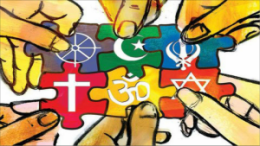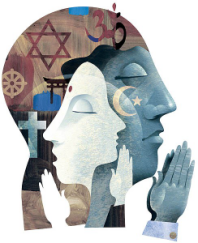Freedom of Religion
BAC Amnesty Club

By Teh Jensen
More often than not, religion is one topic that has the tendency to rile people up and cause waves of controversy. That is to be expected though, with each religion possessing unique qualities, practices and ideologies that would leave a differing impression on each individual. As such, different people associate themselves with different religions, all in accordance with their own personal beliefs.
In many areas of jurisdiction all across the globe, an individual’s freedom to religion is upheld as a basic human right. The European Convention on Human Rights recognises this right under Article 9, where it is stated that ‘every person has the right to freedom of thought, conscience and religion, including the freedom to change their religion, alone or in community with others.’ Likewise, the Malaysian Constitution also indicates that the citizens of Malaysia are allowed liberty to embrace or profess their own religion of choice. Yet the topic remains a taboo and continues to stir up problems whenever it is spoken about within the country. As such, to what extent does this human right apply and why is it such a sensitive topic?
Malaysia is a diverse country in regards to its citizens and the many beliefs that come along with them. This includes the likes of Islam, Buddhism, Hinduism, and Christianity among others, with the first firmly recognised as the country’s official religion, as per Article 3 of the Malaysian Constitution. The concept of freedom of religion is regarded as a fundamental liberty under Article 11 of the Federal Constitution of Malaysia, where ‘every person has the right to profess and practice their religion, with Muslims subject to applicable laws that may restrict other religious doctrines being imposed upon them’. Whilst this essentially indicates that freedom of religion is a fundamental liberty enshrined within the Constitution, the added catch that Malaysian citizens practicing Islam could be restricted by both State and Federal laws on their rights to freedom of religion, is contradictory and unusual.
The act of renouncing one’s affiliation to a religion is known as apostasy. In the case of those converting out of Islam, it is an arduous procedure, with apostates facing many setbacks. In practice, Muslim apostates encounter legal challenges in the process of changing their religion, partly due to Muslim apostasy being widely considered an act of blasphemy and in many Muslim-majority countries, it is a sin punishable by law. In the Malaysian context, the odds are often stacked against Muslims looking to renounce their faith. According to Jamil Khir, former Minister of Islamic affairs, only a mere 125 applications for conversion out of 686 were approved by the Syariah Courts between the years of 2000 and 2010, as stated in the 2020 edition of Malaysia’s Report on International Religious Freedom.
This suggests that the courts would only permit conversion out of Islam in exceptional or extraordinary cases. Whilst it is not a crime at federal level, most states still consider apostasy to be a criminal offense. Cases of apostasy fall under the jurisdiction of the Syariah Courts, and punishments handed to Muslim apostates include fines of up to MYR 5000, caning, three-year prison sentences, and detention in Islamic rehabilitation centres. A landmark case involving conversion out of Islam in Malaysia would be the Lina Joy case, wherein she bypassed the Islamic courts and brought her case to the Federal Court in an attempt to not have her religion assigned as "Islam" on her identity card.
One of the many reasons this topic causes debate is due to uncertainty and inconsistencies in the management of Muslim apostates in accordance to basic human rights conventions. As mentioned beforehand, the fact that Article 11 of the Federal Constitution recognises freedom of religion as a human right, yet specifically states that Muslims could be restricted on this matter is inconsistent with the very principle it is trying to establish. This added on with Muslim apostates being detained in Islamic rehabilitation centres could potentially mean their human rights are breached as per Article 5 of the Federal Constitution, which explicitly states that ‘no person shall be deprived of their personal liberty save in accordance with law’.
However, the biggest question lies with Malaysia’s affiliation with the United Nations (UN). With Article 18 of the Universal Declaration on Human Rights (UDHR) declaring that ‘all humans have the right to their beliefs, to have a religion, have no religion, or to change it,’ Malaysia is placed in a rough spot, with doubts raised on Malaysia’s concept on freedom of religion failing to live up to international standards and whether or not Malaysia’s approach to apostasy breaches international convention rights.
All in all, the scope of freedom of religion in Malaysia and the many complexities surrounding apostasy remains one of Malaysia’s more sensitive issues, and it retains a lot of gray area with religion and politics closely intertwined alongside plenty of questions left unanswered. At the end of the day, a human right should be treated as such, and every individual under the jurisprudence of the Malaysian Constitution should have the freedom to choose their path in regards to religion. Whether it is one of the many religions in Malaysia, or the unconventional such as atheism or agnosticism, all individuals should have a level playing field in pursuing their beliefs.



